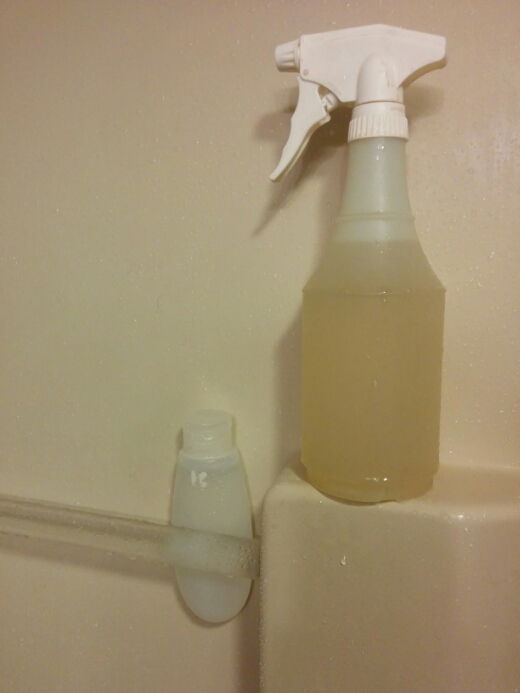 Over the last couple years, we've slowly simplified our bath and body routines and made the switch from "all-natural" manufactured toiletries to homemade concoctions from food ingredients. I discovered that making our own is cheaper, requires very little effort, and works better than what I can buy. Plus there's no wasted packaging or unnecessary chemicals!
The first beauty product I made was hair "conditioner" pictured on the right. This started when Lillian insisted on keeping her hair very long but hated brushing out the tangles. We tried commercial spray detanglers, conditioning shampoo, extra rinses of conditioner and nothing lessened the time we spent fighting with a hair brush. Finally, based on a tip by Chef's Widow, I tried spraying some vinegar on her long locks at the end of a shower.
Over the last couple years, we've slowly simplified our bath and body routines and made the switch from "all-natural" manufactured toiletries to homemade concoctions from food ingredients. I discovered that making our own is cheaper, requires very little effort, and works better than what I can buy. Plus there's no wasted packaging or unnecessary chemicals!
The first beauty product I made was hair "conditioner" pictured on the right. This started when Lillian insisted on keeping her hair very long but hated brushing out the tangles. We tried commercial spray detanglers, conditioning shampoo, extra rinses of conditioner and nothing lessened the time we spent fighting with a hair brush. Finally, based on a tip by Chef's Widow, I tried spraying some vinegar on her long locks at the end of a shower.
Instant success. Not perfection without a single tangle, but brushing is MUCH easier. And the ingredients give me no pause - vinegar and water is truly edible. I began using the vinegar hair rinse myself and ditched the bottled conditioner too.
Vinegar Hair Rinse Recipe
12 ounces water 3 ounces apple cider or white vinegar 2-4 drops essential oil (optional) 16 ounce spray bottle
1. Mix three ingredients in spray bottle. Screw on sprayer and shake to combine. 2. Cover hair with vinegar spray at the end of a shower or bath, paying special attention to ends. Allow to sit for one minute and rinse, or leave on without rinsing.
Using Baking Soda "Shampoo"
Next I moved on to baking soda shampoo, the basis of the "no-poo" routine. Commercial shampoos include strong detergents that strip hair of natural oils. The no-poo idea is to allow your hair to carry oils for better hair health and body. To clean hair, no-poo calls for applying a dilute baking soda solution.
I experimented with different ratios and timing and settled on a very dilute solution poured over my hair like a rinse in my every-other-day showers. There's no lather, so I just smooth it around to make sure most of my hair is covered. Some people advocate scrubbing the scalp, but that seemed to make my hair more oily.
Many people experience a transition period where their hair is extra oily and itchy. I anticipated this and started shampooing less frequently and then using baking soda solution last winter when I more often wear hats. I experienced a week or so of funky hair before mine settled into a comfortable, predictable condition.
Whereas I used to have overly dry hair for 12-24 hrs and then overly oily hair after that, my hair can now go several days without washing with decent body and no itchiness. If I really want to push my time between showers, I use Lush No Drought Dry Shampoo
Baking Soda Shampoo Recipe
1 teaspoon baking soda 6 ounces warm water 2-4 drops essential oil (optional)
1. Shake baking soda and warm water together in a squeeze bottle. Add essential oils as you wish. 2. Pour 2-4 squirts over hair in the shower, shaking to combine before using. Smooth over hair and allow to sit for 1-2 minutes. 3. Rinse with warm water. Follow with vinegar rinse.
Tips on Using Baking Soda and Vinegar Rinses
- Essential oils can address tricky hair issues. The Chagrin Valley Soap Company has a great list of essential oils used in hair care.
- Spray bottles vary in their quality. If I want something cute, I go for the ones in the Target travel toiletries section. For better quality, I buy from the hardware store.
- The vinegar smell dissipates very quickly, as soon as hair is dry. If it bothers you, use essential oil.
- A spray bottle of vinegar conditioner lasts us over a month and costs about $0.50. I mix up a new batch of baking soda rinse every week for mere pennies.
- The 'mother' of active bacterial cultures in raw apple cider vinegar may plug the sprayer mechanism. If you shake well before each spray, this shouldn't happen, but soaking the end of the sprayer in hot water and then spraying that through will usually clear the mechanism.
- Chlorine from swimming pools disrupts natural hair oil production. I try to avoid chlorine pools but when I can't, I rinse with clean water as soon as possible after swimming and expect a few days of overly dry and then overly oily hair.
- When we travel, I pack a smaller container with some dry baking soda but ditch the vinegar spray bottle. We add water to a drinking cup to the baking soda and pour over our hair. For conditioner, we either bring or buy a small bottle of vinegar, add water in a cup, and pour over. I've used individual packs of lemon juice or malt vinegar snitched from cafeterias in place of my preferred apple cider vinegar in a pinch.
Will you try making hair care products at home? Or are you already no-pooing? Share your story in the comments.
